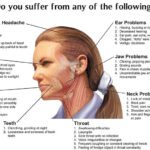TMJ disorder is a typical, regularly misdiagnosed pathology and is commonly called “The Great Impostor” as it can bring several symptoms. TMJ disorder (or TMD) is the general term for the irregular joint function symptoms. It can be very painful at times.
Below are Some of The Common TMJ Signs
- Tinnitus
- the ringing in the ears
- headaches
- muscle and facial ache
- popping or/and clicking sound of the joint
- trouble chewing or eating
- back and/or neck pain
- strain behind the eyes or/and hazy vision
- jaw pain
- restricted opening or movement of the jaw
- crooked jaw opening to one side or the other
- scalloped tongue caused by teeth clenching during sleep
In general, there are two reasons behind TMJ disorder in patients – macrotrauma and microtrauma. Let’s understand them better.
The to begin with, microtrauma is teeth grating or bruxism. The continuous wear-and-tear of the facial muscles and teeth cause burden on the joint, which can cause further TMJ disorder. The consistent strain on the supporting muscles of the TMJ can make the posterior ligament destroy and terribly dislocate joint head. If you suffer from clenching or bruxism, a night-guard may give some alleviation. You can get more information on bruxism and how to avoid this symptom by asking your dental professional.
Another microtrauma is caused by an injury that happens within. Habits, for example, parafunctional (abnormal or outside of a function) gritting of the teeth is a typical reason. Signs incorporate worn out teeth, a scalloped tongue and sore facial muscles – grooves in the tongue surface where the tongue rests in the course of clenching.
A bad bite or occlusion can likewise cause TMJ disorder. If your teeth get together appropriately, the anatomical position of the joint is undamaged. Though, if the teeth gather up wrongly, the joint can be disjoined after some time.
In the event that you are experiencing clenching or bruxism, make certain to visit your dental expert for the best treatment alternatives.
Ladies have TMD more often than men – might be because of the ligaments in the female body have a tendency to have greater laxity, which can make the joint ligaments expand.
Face or head injury can cause TMD. Regardless of whether it’s an overstretched opening due to dental procedures or a car accident, both take place extremely commonly.









